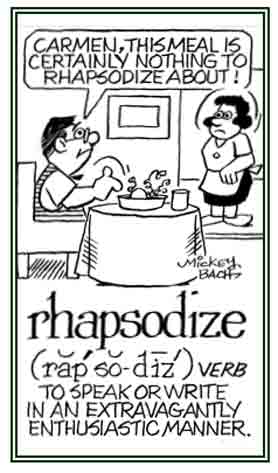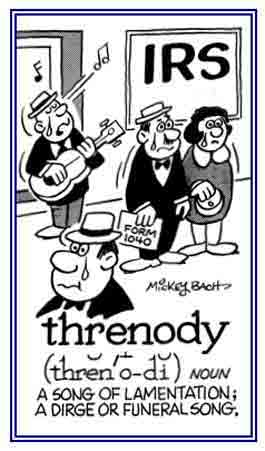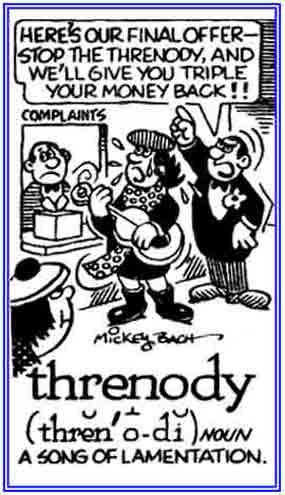ode,-ode, -odal, -odeon, -ody
(Greek > Latin: song, lyric poem)
2. Someone who writes or speaks in an excessive or foolish way or who exaggerates.

Go to this Word A Day Revisited Index
so you can see more of Mickey Bach's cartoons.
2. A feeling of great enthusiasm or the thing that someone says or writes to express such excitement.

Go to this Word A Day Revisited Index
so you can see more of Mickey Bach's cartoons.
2. An expression of sorrow and despair about a situation or condition: The threnody of grief was heard beyond the chapel near the cemetery, where the relatives of the little child who had passed away had gathered.
3. Etymology: from Greek threnoidia, from threnos, "lament" [show sadness or disappointment] + oide, "song".

Go to this Word A Day Revisited Index
so you can see more of Mickey Bach's cartoons.
A tragedy can also be a play, film, television program, or other narrative work that portrays or depicts calamitous events and has an unhappy but meaningful ending.
3. A disastrous event, especially one involving distressing loss or injury to life: It was an expedition that ended in tragedy, with all hands lost at sea.
4. A tragic aspect or element, such as a lamentable, dreadful, or fatal event or affair; a calamity; a disaster: The people of many countries are experiencing the tragedies of war every time the news tells of more deaths.
5. Etymology: from Old French tragedie (14th century); from Latin tragedia, "a tragedy"; from Greek tragodia, "a dramatic poem or play in formal language and having an unhappy resolution"; apparently literally, "goat song", from tragos, "goat" + oide, "song".
![]() More etymological information about
tragedy.
More etymological information about
tragedy.

